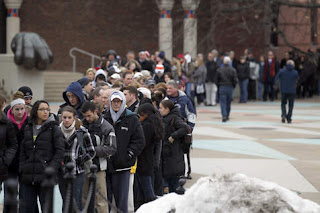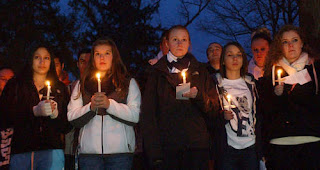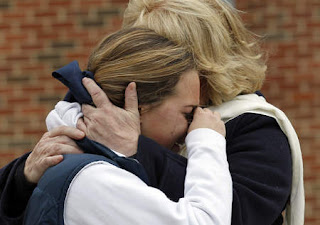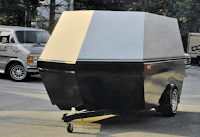photo's by Ray Tharaldson
all rights reserved 2012
By COLLEEN CURRY and OLIVIA KATRANDJIAN
Joe Paterno Jr., whose glittering career as Penn State's football coach was tainted by a child sex-abuse scandal, died today. He was 85.
"It is with great sadness that we announce that Joe Paterno passed away earlier today. His loss leaves a void in our lives that will never be filled," Paterno's family said in a statement.
Paterno coached the Nittany Lions for 46 years and in 2011 became the winningest coach in Division 1 football. But before the season was over, he was abruptly dismissed as the sex scandal involving former assistant Jerry Sandusky suggested that top school officials had ignored signs of Sandusky's alleged predatory behavior.
In a recent interview with the Washington Post, he appeared frail, wearing a wig and speaking in a whisper. He canceled public appearances after the interview because of his failing health, according to family members.
For Paterno's legion of fans, who referred to the coach affectionately as "JoePa," the turbulent final months of Paterno's life were a tragic end to an outstanding coaching career that was built around his motto of "success with honor."
Saturday night, Paterno's wife, Suzanne Paterno, summoned close friends and longtime staff members Saturday afternoon to the State College hospital where Paterno has been undergoing treatments since last weekend, a source told the Citizen's Voice newspaper of Wilkes-Barre, Pa. Paterno wanted to see them and say a final goodbye, the coach's wife told one of the staff members, the source said.
Hundreds of students gathered around the bronze statue of Paterno on the Penn State campus Saturday night, praying for Paterno's recovery, lighting candles and placing blue and white baseball hats at the foot of the statue. Paterno's personal life included service in the Army, an English degree from Brown University, a marriage that lasted more than half a century, and a football team's worth of children and grandchildren.
"He died as he lived. He fought hard until the end, stayed positive, thought only of others and constantly reminded everyone of how blessed his life had been. His ambitions were far reaching, but he never believed he had to leave this Happy Valley to achieve them. He was a man devoted to his family, his university, his players and his community," Paterno's family said in a statement.
While at Penn State's helm, Paterno, who was born in Brooklyn, N.Y., led the Nittany Lions to seven undefeated seasons and two NCAA championships, had only five losing seasons, was inducted into the College Football Hall of Fame in 2007, and was nominated for a Presidential Medal of Freedom. The nomination was revoked, however, after the scandal broke.
Penn State Great Joe Paterno Dead at 85
Paterno was known for his "Grand Experiment" at the university, stressing academic success as well as athletic achievement for his players.
"Just winning is a silly reason to be serious about a game," Paterno wrote in his 1997 book, "Paterno: By the Book." "The purpose of college football is to serve education."
During his tenure, the reputation of Penn State grew from that of a small land-grant university to a nationally ranked research university. The football program ballooned in prestige, with the school's Beaver Stadium expanding six times during his tenure.
Paterno's football program consistently ranked among the top in the NCAA for graduation rates, as well as the top grade point averages for student athletes in Division 1 sports. The achievements helped illustrate Paterno's philosophy on collegiate sports and on life, as he said in a 1973 commencement speech to Penn State graduates, that "Success without honor is an unseasoned dish; it will satisfy your hunger but it won't taste good."
And despite offers from other universities and NFL football teams, including an ownership stake in the New England Patriots, Paterno remained at Penn State, where his base pay was only a fraction of that of other top football coaches in the country. His base pay in 2011 was a little less than $600,000. He and his wife, Sue, donated more than $4 million to the university, which named a library and a campus spirituality center for them.
Paterno was also involved in politics, supporting conservative candidates in Pennsylvania and befriending presidents George H.W. Bush and Gerald R. Ford, who tried but failed to convince the coach to run for office.
Paterno spoke at the 1988 Republican convention in support of Bush.
Bush's son, President George W. Bush, visited Penn State's campus in 2005, noting his respect for Paterno.
"I tell you one thing about Joe Paterno, there's no more decent fellow on the face of the Earth," Bush said. "What a man, who sets high standards, he loves his family, he loves this university, he loves his country, and my mother and dad love him."
Joe Paterno Leaves Football Legacy
Although he was the most well-known person on Penn State's campus in State College, Paterno was also seen as a picture of humility. Students at Penn State knew that Coach Paterno lived nearby in a modest ranch home he bought for $9,000, and walked from his house to each home football game. He and his wife remained listed in the public phone book, and his children went to the town's public school.
At his direction, the team wore simple uniforms, donning blue jerseys without names and simple white helmets without logos, and plain high-top black shoes. The austere style reflected that of the coach, who wore to nearly every game the same thick-framed black glasses, rolled-up pant legs and white athletic socks.
But Paterno's reputation was called into question in November 2011 when allegations of child sex-abuse surfaced against former Penn State defensive coordinator Jerry Sandusky. A grand jury presentment detailed an incident that took place in 2002 in the Penn State football complex, in which an assistant coach allegedly saw Sandusky in a shower, naked, with a young boy, in a position that seemed sexual.
The assistant, Mike McQueary, testified to a Pennsylvania grand jury that he reported what he saw to Paterno, who in turn told his superiors. No one called the police.
Paterno was accused of doing too little to ensure the safety of children on campus, although he was not legally bound to call the police.
Penn State Mourns Joe Paterno's Death
In his last interview before his death, Paterno told the Washington Post that he wished he had done more when faced with the allegations against Sandusky.
"I didn't know exactly how to handle it and I was afraid to do something that might jeopardize what the university procedure was," he said. "So I backed away and turned it over to some other people, people I thought would have a little more expertise than I did. It didn't work out that way."
Paterno was fired by the Penn State Board of Trustees during the week after the scandal broke, three games before the end of the 2011 season and six weeks before his head coaching contract expired. The board said Paterno's ability to lead had been "compromised."
In the wake of the scandal, Pennsylvania's senators withdrew their support for his nomination for a Presidential Medal of Freedom, and Paterno's name was removed from the Big Ten Conference championship trophy.
During his induction into the Hall of Fame in 2007, Paterno expressed joy at a career spent coaching football.
"How good has it been? What we share in football; there's never been a greater game. We've been involved in the greatest game, the greatest experience anybody could hope for. Great teammates. Guys you could trust. Guys you loved. Guys you would go to war with tomorrow. We're so lucky. We're so lucky," he said.
Paterno is survived by his wife, Suzanne Paterno, their children, Diana, Joseph Jr. "Jay", Mary Kay, David and Scott, all of whom are Penn State graduates, and 17 grandchildren.
In lieu of flowers or gifts, the family requests that donations be made to the Special Olympics of Pennsylvania or the Penn State-THON (The Penn State IFC/Panhellenic Dance Marathon).
THE PATERNO RECORD
Season Won Lost Tied Bowl
1966 5 5 0
1967 8 2 1 Gator: Tied Florida State, 17-17
1968 11 0 0 Orange: Beat Kansas, 15-14
1969 11 0 0 Orange: Beat Missouri, 10-3
1970 7 3 0
1971 11 1 0 Cotton: Beat Texas, 30-6
1972 10 2 0 Sugar: Lost to Oklahoma, 14-0
1973 12 0 0 Orange: Beat LSU, 16-9
1974 10 2 0 Cotton: Beat Baylor, 41-20
1975 9 3 0 Sugar: Lost to Alabama, 13-6
1976 7 5 0 Gator: Lost to Notre Dame, 20-9
1977 11 1 0 Fiesta: Beat Arizona State, 42-30
1978 11 1 0 Sugar: Lost to Alabama, 14-7
1979 8 4 0 Liberty: Beat Tulane, 9-6
1980 10 2 0 Fiesta: Beat Ohio State, 31-19
1981 10 2 0 Fiesta: Beat Southern Cal, 26-10
1982 11 1 0 Sugar: Beat Georgia, 27-23
1983 8 4 1 Aloha: Beat Washington, 13-10
1984 6 5 0
1985 11 1 0 Orange: Lost to Oklahoma, 25-10
1986 12 0 0 Fiesta: Beat Miami (Fla.), 14-10
1987 8 4 0 Citrus: Lost to Clemson, 35-10
1988 5 6 0
1989 8 3 1 Holiday: Beat Brigham Young, 50-39
1990 9 3 0 Blockbuster: Lost to Florida State, 24-17
1991 11 2 0 Fiesta: Beat Tennessee, 42-17
1992 7 5 0 Blockbuster: Lost to Stanford, 24-3
1993 10 2 0 Citrus: Beat Tennessee, 31-13
1994 12 0 0 Rose: Beat Oregon, 38-20
1995 9 3 0 Outback: Beat Auburn, 43-14
1996 11 2 0 Fiesta: Beat Texas, 38-15
1997 9 3 0 Citrus: Lost to Florida, 21-6
1998 9 3 0 Outback: Beat Kentucky, 26-14
1999 10 3 0 Alamo: Beat Texas A&M, 24-0
2000 5 7 0
2001 5 6 0
2002 9 4 0 Capital One: Lost to Auburn, 13-9
2003 3 9 0
2004 4 7 0
2005 11 1 0 Orange: Beat Florida State, 26-23 (3 OT)
2006 9 4 0 Outback: Beat Tennessee, 20-10
2007 9 4 0 Alamo: Beat Texas A&M, 24-17
2008 11 2 0 Rose: Lost to Southern California, 38-24
2009 11 2 0 Capital One: Beat LSU, 19-17
2010 7 6 0 Outback: Lost to Florida. 37-24
Totals 401 135 3 Bowls: Won 24, Lost 11, Tied































